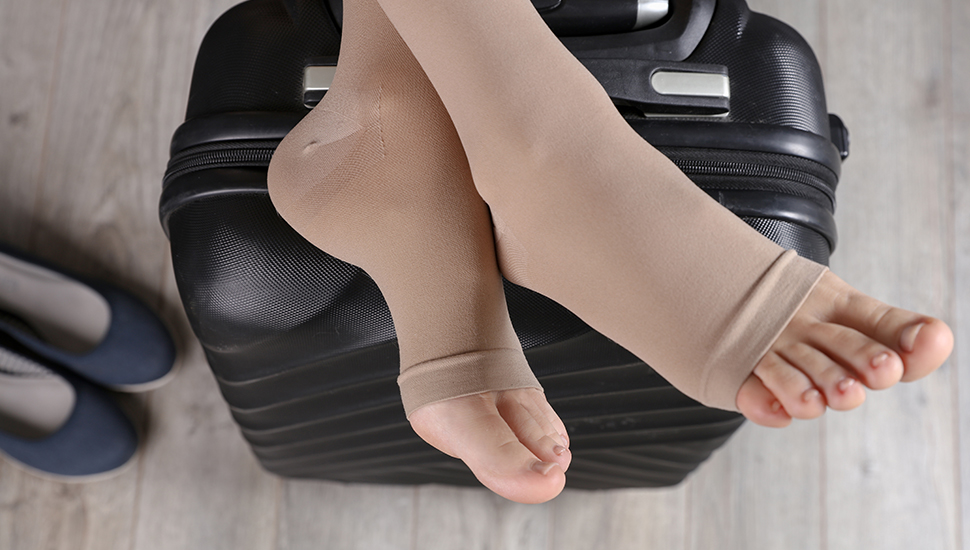5 Medical Conditions that Prevent you from Flying
Jetting off to sunnier climes is one of life's great joys, but if you suffer - or have suffered - from certain medical conditions, flying isn’t always possible.
Long-term, stable conditions do not usually mean you are unable to fly, but always check with your doctor first.
Other more serious conditions may require a Fit to Fly certificate from your GP - or you may be told flying is out of the question.
Here we look at some of the common medical conditions that prevent flying - or at least make boarding a plane inadvisable.
Do bear in mind that, even if you suffer from one of these conditions, there may be other ways to travel overseas for a holiday, discussed below.
5 common illnesses that prevent you from flying
Strokes creating DVT risk
If you've recently suffered a stroke or mini-stroke (TIA – Transient Ischaemic Attack), you may be at increased risk of developing Deep Vein Thrombosis (DVT). These are among the most common illnesses that prevent you from flying.
DVT occurs when a blood clot forms in a vein - often in one leg. Common symptoms include throbbing or cramping, swelling and warmth around the location of pain.
If you've suffered DVT, be sure to check with your GP to see if you are fit to fly.
You'll also need to tell your travel insurance provider about having DVT, and detail: how many strokes you've had; when your last stroke was; and if you need to take medication to thin your blood.

Deep Vein Thrombosis (DVT)
If you already suffer from Deep Vein Thrombosis (DVT), you'll need to discuss with your doctor the possibility of flying. DVT is one of the most common health conditions that prevent flying, affecting about 1 in 1,000 in the UK (more than 600,000 people)
You'll also need to answer a few questions in order to obtain travel insurance. These are likely to include:
- How many times have you suffered a blood clot?
- Did you have any lung blood clots?
- Do you take blood-thinning medication for your DVT?
COPD (chronic obstructive pulmonary disease)
COPD is a condition whereby the lungs cannot expel air as efficiently as they should, because the airways have become narrowed.
Long-term (chronic) bronchitis and emphysema come under COPD.
Flying with these kinds of medical conditions can be risky because the pressurised air inside the plane is less saturated with oxygen. Long-haul flights are a particular risk and are therefore not recommended for COPD sufferers.
As regards travel cover, you'll also need to make your provider aware if you have COPD. They will likely ask the following questions:
- To what degree do you suffer shortness of breath while walking on level ground?
- Have you been admitted to hospital in the past 12 months?
- How many inhalers have you been prescribed to combat your COPD?

Infectious diseases like influenza
If you've recently suffered influenza, you'll probably need a Fit to Fly certificate from your doctor. This also applies to other infectious diseases.
Flying with current and ongoing medical conditions such as these is of course out of the question.
Airlines have the right to refuse boarding to anyone they deem unfit to fly.
And once again, your travel insurer will need to know if you've suffered from any infectious diseases recently.
When applying for cover, it’s a good idea to be ready with as much information as possible, including dates of infection and recovery - and of any related medication you're taking.
Recent surgical procedures
If you've recently undergone surgery, you may need to wait a certain period before flying.
For minor surgeries this may be as little as a week two. For more serious operations, a three month wait may be required.
Flights - particularly the long-haul variety - can put strain on the body. Aside from the general discomfort of being confined to a seat for multiple hours, there's a risk of dehydration and blood flow restriction, the latter of which can lead to DVT.
To take out travel cover you'll need to tell your provider what surgery you've had, plus dates and any medication you’re taking to manage the recovery.

Can't fly? Consider these alternatives...
Holiday by coach
Many travel companies organise coach trip holidays, both in the UK and on mainland Europe.
They offer an easy - and often affordable - way of staying on the ground while visiting historic towns and cities.
They do involve lots of sitting, but regular breaks and stop-offs are invariably built-in.
You might also choose regular coach operators for getting from A to B. You won’t get any guided commentary along the way, but they are a great alternative to flying.
Holiday by train
You can board a train in London and be in Paris in 2 hours 16 minutes, Brussels in 2 hours 9 minutes and Amsterdam in just over 4 hours.
Considering how long it takes to reach an airport, check in and board, travelling by train can be much quicker than by plane (for these destinations, at least).
For more distant places - e.g. Barcelona or Prague - you might break up the journey with overnight stays enroute.
Then there's the pleasure of train travel - the great window views (nearly always better than those afforded by coach due to the raised travel position), and the ability to take a walk down the aisle or visit the buffet car.
If you're visiting France or the Low Countries (Belgium, the Netherlands, and Luxembourg) and can't go by air, then the train is a great (if not better) alternative.
Cruise Holidays
But if you like to stretch your legs while travelling, cruise ships are king.
The Canary Islands and the Mediterranean are popular non-fly cruise destinations.
What's more, modern vessels often feature ramp-access balconies, pool lifts and other mobility-friendly amenities.
There are also travel firms specialising in holidays for disabled people, offering adapted cabins, port assistance, mobility equipment hire - and more.
Get a Quote